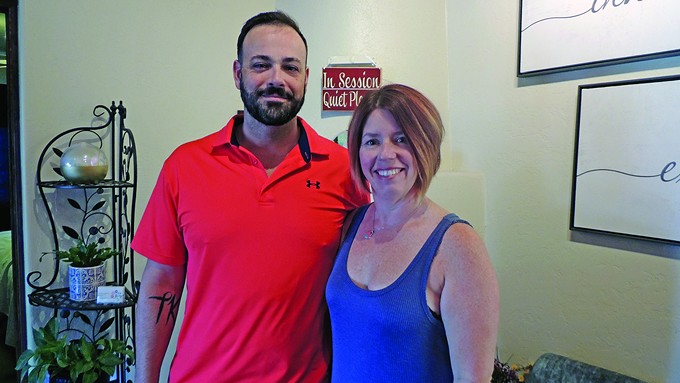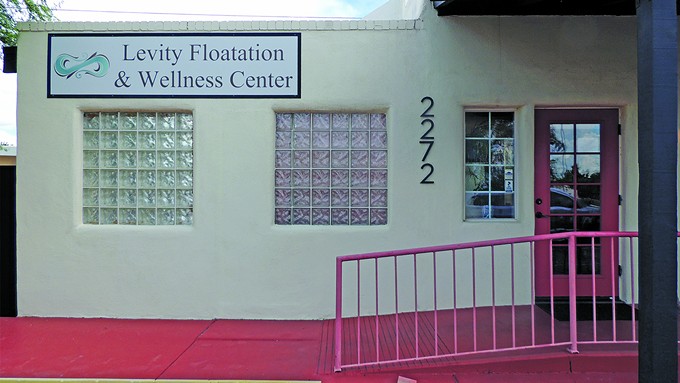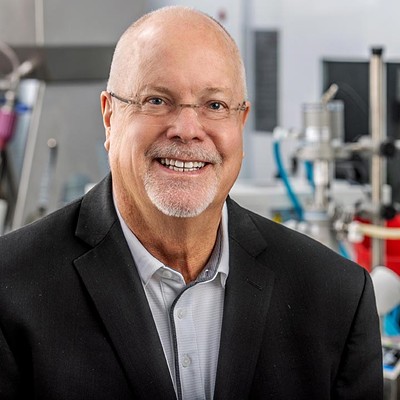
Water, darkness and Epsom salt are the keys to deep therapeutic rest, according to Jason and Lindsey Krauss, the owners of Levity Wellness Center near the UA.
“We specialize in REST/Floatation therapy,” Lindsey said. “We are a small, yet adorable local business that does wonderful things for the community. We are thanked by our guests every day that we are here.” Levity Wellness Center is Tucson’s only brick-and-mortar floatation business.
Levity Wellness Center also offers massage therapy, cupping and body work; infrared sauna; IV therapies through Valley IV, and breathwork classes.
A single 60-minute float is $60 and pricing increases by length of session. You can purchase float packages as well. One of their most popular treatments is to float followed by massage therapy.
Their guests are varied — those who seek treatment for chronic pain, anxiety, depression, concussions, PTSD or addiction, among other issues.
“We have a lot of veterans and first responders who come in and utilize our services,” Lindsey added. “For many, this is a moment of peace they couldn’t otherwise achieve.”
He said he discovered floating therapy through the Float Shoppe with Lindsey while on vacation in Portland, Oregon, in March 2013. Three years later, he broke his neck.
“In April of 2016, I sat up in bed, heard a loud pop, and broke a disc in my neck,” Jason said. “I sat up and we both heard it, it was an unforgettable sound and we both said, ‘What was that?!’ Three days later, I had areas with no feeling, from my neck all the way down to my fingers with excruciating pain.”
After his spinal surgery and recovery, Jason said he could not wait to get back into the tank.
“I was alternating between physical therapy, floating and massage, and repeat, for about 18 months,” he said. Within 3 years of the injury, he was in the best shape of his life, much of which he credits to the recovery methods they offer at Levity.
“We had been customers here for probably six years,” Lindsey said. “After the COVID-related closures, the previous owner asked us if we wanted to buy it, so, after many hundreds of conversations, we decided to take the plunge.” They purchased the business on April 8, 2021.
Jason loves the business because of the calming effects after floating. “It is undeniable, you can’t fake the calmness and the serenity it brings for a lot of people,” Jason said. “And for somebody who is from the extreme… we have regulars who can be very salty, or less friendly, but after a float they make eye contact and say thank you. Some guests have sat for up to an hour telling us their story and being so grateful that ‘something like this is in Tucson,’ and they leave in a clearly better state of mind.”
One of Jason’s doubting friends also learned of the benefits of floatation therapy. “A friend of mine was in the Samadhi tank for the first time, and he had a separated rib. To date, he couldn’t stretch enough to get it back in the right place,” Jason said. After about 10 minutes, Jason heard his muffled, yet excited voice. He was able to pop his rib back in and he could breathe again.
Lindsey said she loves the sharing of their customers’ experiences.
“Talking to all the people after (their float time), on why they do it and how they feel about it after, is my favorite part of being here,” she said.
Levity Wellness Center has two tanks from which to choose.
The Levity Samadhi tank has simplicity in mind, focusing on creating the best possible float experience. For 40 years, it has provided an environment with as few distractions as possible, a space of nothingness, where the floater is suspended in weightless silence. The tank provides a comforting womb-like environment. It is an original float experience with deep meditation.
The center also features the Levity Float Room, which adds more space with easy entrance and exit. Unlike many with a hatch lid, the float room has a glass door for easy access. Customers control a dim blue light that ensures a sense of control and an open feeling, unlike many pod- or tank-style therapies. It provides an open feel with plenty of space to stretch. (The tallest to float yet is 6-foot-10, and he fit.)
Each float tank contains 12 inches of body temperature water with 1,000 pounds of Epsom salt, also known as magnesium sulfate. It’s a chemical compound made up of magnesium, sulfur and oxygen.
The float tank is soundproof, lightproof and the salt water provides an anti-gravity environment. The isolation tank makes the user feel weightless as if he/she is in a womb or floating in space. It allows the “brain to focus on the needs of the body with a deeper sense of awareness,” according to the website.
With a 60% return rate, customers include pro-am athletes; cyclists prior to the El Tour De Tucson event; Tucson Appliance’s Chris Edwards; and Delaney Schnell and Jessica Parratto, two 2021 Olympic silver-medal winning synchronized divers.
Floatation therapy has clinically proven results. “People come in with focus issues, or sleeping problems, or ADHD, trauma, grief, anxiety,” Lindsey said. “The level of magnesium in these tanks is proven to have marked effect, not to mention the time to let your brain unplug in an environment of all output and no input, and ‘see’ what it does.”
Dr. Justin Feinstein is the coordinator and driving force behind the Float Research Collective, clinicalfloat.org.
“There is a massive wealth of information regarding clinical tests around floating and the impact of it,” Jason said. “There is a massive amount to still learn from clinical testing and we will be doing all we can to support it. Everyone deserves the right to have access to mental wellness too, and this is another incredible tool.”
He said Feinstein’s team ran tests on a clinical group.
“They took a control group of individuals and asked a third of the group to sit and relax, watching nature documentaries, (then) one control group and the other third were to float.” Jason explained. “They tracked the results of their cortisol, HRV, blood pressure, and their heart rate, pre/amid/post treatment. They found out the more stressed, the more anxiety and the worse someone scored, they found the more stressed had a stronger reaction to the float tank and found a significant drop of stress, blood pressure, resting heart rate.”
However, those who are extremely stressed and the vagus nerve is incredibly overwhelmed, they found float therapy to be helpful.
“We strive to be another Tucson gem that does right by its community,” he said.
Levity Wellness Center
2272 E. Speedway Boulevard, Tucson
Call/text 520-339-6674; levityrising.com
levitywellness@outlook.com














